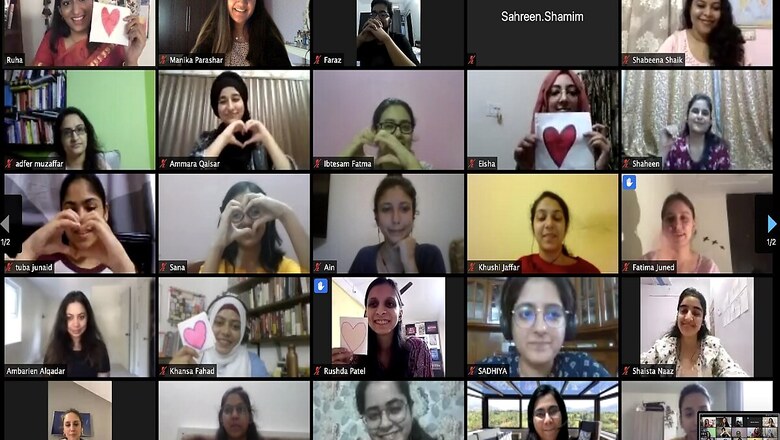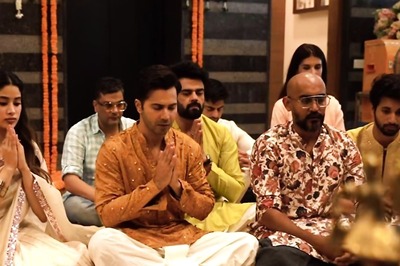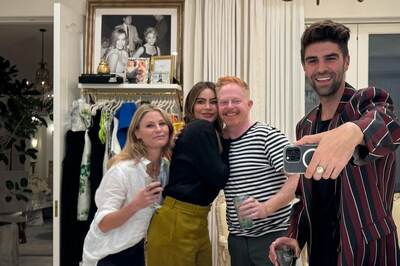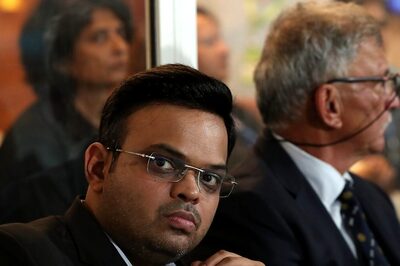
views
“There is a lack of awareness about the way Indian Muslim women exercise their agency.” “There is unity in diversity on papers but at the workplaces the acute absence of Muslim women is disturbing.”
When confronted with these realities, you either let things be or sow an idea to reap the agency of Indian Muslim women by providing leadership training. Dr Ruha Shadab went for the latter.
She founded the Led By Foundation, which is a Harvard incubated organisation focused on bringing Indian Muslim women closer to workplaces and contributing in the country’s growth. “The world’s largest democracy has 100 million Muslim women. We are building an ecosystem for this community to achieve its potential. With collaborative support and effective mentorship, Indian Muslim women can have a positive and magnifying effect on the country’s cohesiveness, while also supporting India’s economic growth,” announces the foundation’s webpage. Its programmes are run to empower Muslim women enrolled in college or graduate schools through a rigorous yet supportive non-residential leadership-training program.
One of the new admirers of the initiative is the vice chancellor of Jamia Millia Islamia university Najma Akhtar. While delivering the keynote address at the international webinar on Gender Law and Politics under the aegis of the foundation this month, she said she is “impressed”.
In her session, she pointed out that the All India Survey of Higher Education 2016-2017showed continued higher enrolment of women and the Muslims in higher education in the country. The literacy rate of the Muslim women is 51.9%. The gross enrolment ratio in higher education is 6.16%. According to the latest report, 49% of Muslims enrolled in higher education.
On the other hand, Aligarh Muslim University vice chancellor Tariq Mansoor announced in the Sir Syed birth centenary celebrations that he has proposed to the ministry of education a project for starting the Centre for Professional Education for Women. There is a force that needs to be reckoned with, echoed Akhtar in her discussion.
The woman and her idea
Born in Saudi Arabia where her father worked as a doctor, Ruha Shadab and her siblings moved to India while she was in middle school. She graduated from Lady Hardinge Medical College. “My most formative years were spent there. I was pulled to system changes from my early days of medical education. I became a doctor because of the social impact it has, and the scope of the impact pulled me into public health, then public policy, and now social entrepreneurship,” she said in an email.
She has worked as a general physician, as a public health professional with an international health NGO, with the Government of India. Her last job before Harvard was at NITI Aayog working under the bureaucrats Amitabh Kant and Alok Kumar.
She applied to Harvard because she liked their public policy master’s programme. “It was inter-disciplinary and had an international lens. I wanted that perspective to better understand and then solve India’s seemingly intractable social issues,” she said.
She grew up hearing of unity in diversity but failed to locate proportionate number of Muslim women. “I was very curious about where this diversity that we were taught in school – ‘unity in diversity.’ I didn’t see a proportionate number of Muslim girls or women in my school, college, or workplace. It was tiring, lonely, and at times just downright disturbing to not see Indian Muslim women,” Shadab said.
That’s when she pitched a leadership lab for Indian Muslim women at Harvard’s social innovation fellowship and got picked as one of the 15 students selected from across the university. Led By was incubated through this fellowship programme in April 2019.
She said, “We are 100 million in number in India. This community has not been given access, avenues, and agency to achieve its aspirations and ambitions. It is probably one of the biggest latent engines of national growth.”
When we say Indian Muslim women, we put “three identities together. You’d imagine that this would create a homogenous group of sorts. But that is far from the case. It is a diverse group with varied ambitions,” said Ruha.
A firm believer in their strength, she said, “Muslim women’s participation in the workforce needs to be a national priority for economic reasons, financial reasons, health reasons, social reasons. Getting their participation to rise will have positive externalities that will benefit the country at large.”
The problem her group is addressing is the lack of diversity in the Indian workplace in terms of presence of Muslim women.
There is no availability of recent and layered data showing what is the proportion of Muslim women in different industries and levels of seniority, she said and suggested that it would be of great assistance if there was something similar to McKinsey’s “Women in the Workplace report” that comes out in the US. This would help her understand the “bottlenecks to participation of Muslim women”, she said.
Ruha pointed out that there is interesting research looking into the supply side of the issue, which covers home and happenings within the community. But, she said, “There is almost no data on the demand side of the issue. Something that covers the workplace, the needs and struggles of an Indian Muslim woman and an interplay of her gender identity, her religious background and a host of other factors.”
With over a thousand interviews, Ruha understood the lived experiences of Muslim women and identified two key elements in her mission to visibilise the agency of Indian Muslim women at work.
One of the key elements for her is, ‘tribe’; “create a supportive and encouraging tribe of Muslim women professionals who share stories and advice,” she said. Another is, ‘allies’; “and create the largest community of allies, that is senior professionals, men and women, from other faiths who share opportunities with young Indian Muslim women and also remind us of the large number of people who believe in the vision of an India that creates space equitably, for all its citizens,” she said.
On board with Ruha’s foundation are people from across professions and faiths to mentor the fellows associated with India’s first such programme.
The allies
The initiative has participation from non-Muslims as well who are bringing in their expertise in navigating the professional world and providing assistance. One of the members is Anita Guha who is employed in an MNC but is also extending her experiential knowledge for honing the leadership skills of Indian Muslim women.
She first met Ruha at a virtual meeting organised for the Harvard Club of Bengaluru (Guha was a graduate of Harvard). As Led By is focused on women, Guha wanted to use her expertise as a former ‘diversity leader’ at IBM India, and facilitator of their flagship programme, BRI (Building Relationships & Influence), which is targeted towards high-potential women to prepare and encourage them to aspire for executive leadership roles, at the foundation’s workshops.
“I’ve been thinking about diversity and inclusion for some time and I’m aware and concerned that – even in our organisation – while we drive a variety of initiatives to encourage gender diversity, people with disability, and LGBTQ, even some generational diversity, we are not doing much in the area of religious diversity and caste diversity,” she said.
And the religious minority that was particularly on her mind was Muslims. “Especially given the rise of Hindutva politics in our nation, it was naturally, Muslims,” she said. This was a good opportunity for her as well to educate and acquaint herself with this minority, “and also be of service,” she said.
Through this participation, Guha is discovering the impact of intersectionality first hand and even though she did not have stereotypes attached to Muslim women, she did not have a real idea either. “I didn’t think I had stereotypes about Muslim women,” she said. “But in my first workshop, when I got introduced to such a range of amazing, strong, and powerful Indian Muslim women, I realised that perhaps, I did have an unconscious bias. I had, unwittingly, set my expectations lower.”
The potential, diversity and talent pulled together by Ruha did surprise Guha.
How the workshops work
The workshops are contextualised for the Led By fellows. One of them was on the “negotiations”, which was taught by Harvard University.
In these workshops, Indian Muslim women are protagonists and situations in the case studies are adjusted to align with experiences that make it easier for an Indian Muslim to identify with. The training is in line with ground realities – stereotypes, Islamophobia and prejudices.
Since its inception many of the fellows have unpacked their stories and learnt leadership in return. Over the course of three months, Khushi Jaffar attended five “brilliant workshops” that really helped her broaden her perspective. She is currently an undergraduate student at National Law University, Delhi. Her schooling is from Delhi Public School, Ruby Park, Kolkata, where she studied science with biology.
In one of the workshops by journalist Sameera Khan, the fellows explored “how identity markers like gender and religion influence our freedom to navigate public spaces,” said Jaffar. The workshop with Joan Moon from the Harvard Kennedy School’s Women and Negotiation programme is the most defining one. “Here I learnt about how cultural elements influence our daily negotiations, be it for a job or even in renting an apartment,” she said. Reminiscing what her fellow Sahreen said about the daily struggle, she said, “Everything is a negotiation.”
Most of the fellows come from educated family backgrounds, though some are from ‘urban ghettos’, and these workshops provide exposure in customised settings.
While training with Hub Dot and Sharon D’Agostino, the fellows learnt sharpening of their skills in impactful storytelling, which is an important component as they navigate in the world. “I realised that representing yourself to the world using empowering language and goal-oriented statements makes a huge difference in how we perceive our potential with these particular workshops,” Jaffar said.
Discovering the power of even minor acts of assertion has shaped them into the people they are, “even if it was something as little as standing up for my pet cat is an act of power,” she added.
For Alisha Ali, who has completed her post-graduation recently in Conservation, Museum Studies and Heritage Management from Delhi Institute of Research, the personalised leadership programmes are a big hit. Currently pursuing her training in Conservation of Cultural Property from NRLC, Lucknow, and also working as a research analyst for ‘Rising Beyond the Ceiling,’ Delhi team where, she said, “We are listing 100 inspiring Muslim women in Delhi.”
Interested in Urban Heritage Management of Old Delhi, the negotiations workshop and the workshop with Hub Dot (connecting network) were customised to the fellows’ ambitions.
In each workshop the fellows were given prereads and inputs to be provided prior to the session. The negotiation workshop required real life experiences and they were to draw solutions for the same. During the Hub Dot workshop the fellows framed their own story in a minute introduction. “We were individually mentored to revoke appreciation and connect with people through our story with the power of that minute,” Ali said.
There was a ‘kitchen cabinet’, which was like a raja-mantri setup, Ali added. “The president of the week will list the challenges she is facing or any advice she wants to seek from her four cabinet members,” she said. And these four members would discuss the president’s problem and give suggestions/solutions.
The experience of the workshop was no different for Shaheen Khan a TISS, Mumbai alumni who got to know about the fellowship through one of the alumni groups. In her three-month-long fellowship (online) she had various workshops that were focused on career negotiation skills, leadership skills, building stories, exploring the journey of their identity, etc.
“Mostly the workshops were holistic as each session included various elements like a pulse check-in where we updated each other about our week, workshop by a facilitator, reflective sessions. We also indulged in various discussions during the course of the fellowship,” said Khan. The fellows prepared reflective reports on which the founder and CEO gave her feedback.
This mentoring was also followed by networking and helped the women shape their career path and learn from the journey of successful Indian Muslim women. “With this fellowship my leadership skills, negotiation skills, and storytelling skills have enhanced. The fellowship acted as a safe space to unpack our stories and to make meaning of our journey,” said Khan.
Impact on fellows
In the longer term one might find Alisha Ali starting her own version of Led By for Old Delhi women, as she said the idea of honing leadership skills was occupying her mind.
She said she was privileged to attend educational institutions, which shaped her into what she is today but wondered why her interaction with Muslim women in institutions was nil. “I have been shaped by the people I have mingled with and amongst which interaction with Muslim women was nil,” she said.
Many of them either married or dropped out. “I want our community to understand that marriage is not a career option one does not have to live as per the whims and fancies of the society. Education is a necessity and not marriage,” said Ali.
With these workshops Jaffar, realised that she had neglected her responsibility as an Indian Muslim woman. “I realised that I had neglected my responsibility in understanding my culture and my gender, and how it influences my power as a person. My primary goal is to understand how these elements of my personal identity interact with my profession, and hopefully use this understanding to help others navigating similar challenges, especially at the student level. I think there is a lack of awareness about how a Muslim woman exercises her agency in the country,” she said.
Having been routinely at the forefront of struggles in this country, their agency is still uncelebrated, but perhaps not anymore.
Read all the Latest News, Breaking News and Coronavirus News here




















Comments
0 comment